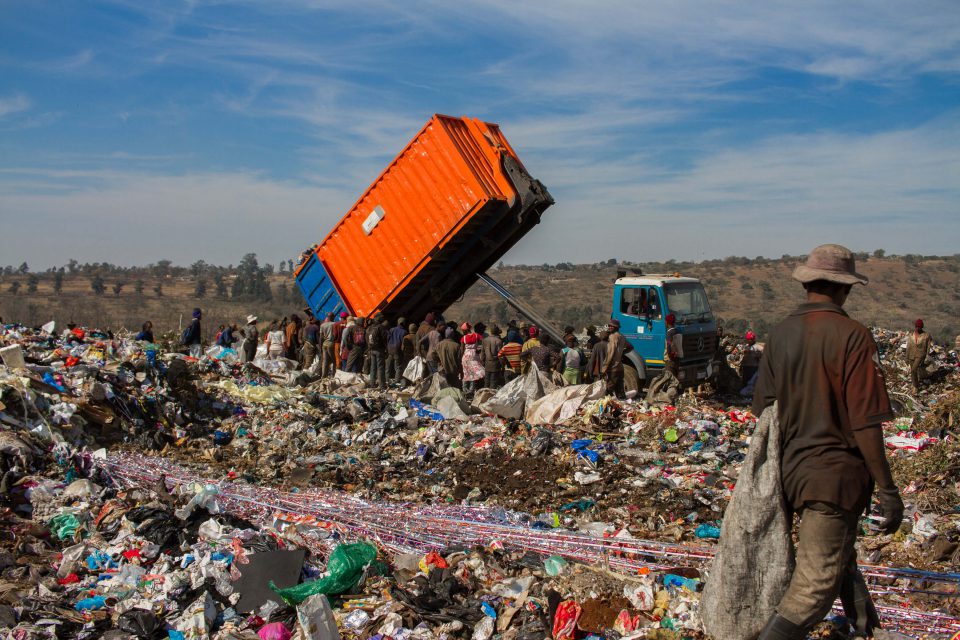The waste pickers of Pietermaritzburg
Eking out a living by sorting waste from landfill is a dangerous, dirty and difficult job. But the thousands of people who do it have no other way of earning an income.
Author:
30 July 2019

The sun rising over the New England Road landfill site in Pietermaritzburg signals the beginning of a new day for Xolani Gcina.
The 30-year-old wakes up early each morning and gets to work, scavenging the dump for valuables he can resell to make enough money to buy a meal. It is a meal for which he fights fiercely, competing with flies, mosquitoes, cockroaches, rats, monkeys, dogs and noisy seagulls. It is a fight that is sometimes deadly.
The Msunduzi municipality’s landfill site also services the neighbouring municipalities of uMshwathi and Mooi-Mpofana. Centrally situated along the N3 highway, the municipality links the surrounding towns of Durban, Estcourt, Greytown and Richmond.
The KwaZulu-Natal water affairs department authorised the landfill site to start operating in 1998 and the provincial environmental affairs department issued a revised waste management licence in July 2017, according to the licence documentation. It is valid for 10 years.
The dump is on the farm Darvill, between the suburb of Sobantu, the Darvill wastewater treatment site and the Pietermaritzburg golf course, about 2km south of the N3 highway. It is generally used for domestic, inert (waste that doesn’t break down, such as sand and concrete) and garden waste.
When vehicles arrive, they pass through the dump’s access-controlled weighbridge. Men are already waiting for the trucks and bakkies to tip their loads, so they can begin the process of sorting the waste. Some jump up on to the vehicles before they’ve unloaded.

‘The people’s hustle’
Gcina is originally from Lesotho and has a child, four-year-old Lusanda. In December he turned to the New England Road landfill site, which has the capacity to hold more than 25 000 tonnes of waste and is the size of about two football fields, because he was struggling to find a job.
“I was living in Durban and my grandfather said I should come and try out here, instead of sitting at home and resorting to crime.” He added that “this is the people’s hustle. But sometimes it is dangerous.”
Malawian James Stuward died on Monday 15 July when he slipped and fell after he and other waste pickers had jumped on to a compactor truck from a waste management company in Mkondeni, according to The Witness newspaper. He is not the only person to have died on the site.
But Stuward’s death has not deterred Gcina and others from returning to the dump. Wearing a balaclava, Gcina leaves his home in the eHlathini shack settlement that borders the landfill at 7.30 each morning. Because it is a municipal facility, no one is permitted to erect a shack or dwelling inside the confines of the dump.
“The first thing I do when I arrive in the morning is separate the refuse. Sometimes I make as little as R200 a month, so you can see that I could never afford rent.”
At Gcina’s workstation, flattened boxes, glass bottles and plastic bottles and items have been packed neatly into large, different colour sacks, ready to be sold.
“Sometimes I can make between R1 000 and R1 500. A sack can weigh up to 70kg to 80kg depending on how much you put in it. We get paid R2 for 1kg of plastic, 70c for a kilo of cardboard, clear plastic bottles R2, milk cartons are R3.20 per kilo and [small] beer bottles are 40c, and then cans are R8 per kilo.”
Gcina buys mielie meal for himself with some of the money he makes and sends some home. “When I am hungry, I eat whatever has been dumped here. It is tough to make money here, but I am grateful that God is still with me.”

‘We find everything here’
Gcina beams when he speaks about his childhood dreams. “I did not want to be anything in particular, but I knew that I wanted to have a house and drive my own car. I don’t want to lie, I wanted a simple farm life, but things didn’t work out that way,” he said as a compactor truck pushed refuse in front of him, stirring up the stench of decomposing waste.
Gcina shook his head when talking about some of the items found at the dump: from infants in boxes, dead and alive, to used condoms, nappies and food that is about to expire. “We find everything here,” he said.
“Once a man found R20 000. We also found a baby that was still alive and we called the social workers. What I like about this place is that we try and not bother one another because we are here for the same hustle. But it is risky, it is a big risk being here.”
Nomsa Ngxongo walked up to Gcina to greet him as she prepared for her day’s work. Ngxongo lives in Thembelihle near the Madiba township and began working as a waste picker at the site in 2013 when she could not find other employment.
Ngxongo, who waves the flies away from her face when she speaks, receives a state grant of R1 200 a month for her three children. She uses the money she makes at the dump to buy groceries.
“Life is tough here, especially if you are a woman. We fight among each other for the refuse. You will die … life here is about survival of the fittest.”
The 32-year-old said it helps to surround yourself with people who can help look after your day’s collection and, most importantly, protect your life.
“There are people who behave like the mafia. When a truck comes into the dump, they want first dibs into the fresh waste that is being discarded.”

Competition from many quarters
The women and men on the site are not the only ones competing for food and reusable items. “There are monkeys, dogs, birds, rats, flies and cockroaches here. People get sick and they die because of the inhumane conditions we work under,” said Ngxongo.
There are children who have been raised on the dump site.
“Sometimes we sleep here and guard the work we have done because we have amaphara (homeless people) that steal our stuff.”
The lifespan of the dump is projected to come to an end in the next five to 10 years and talks are under way to find a new landfill site, meaning the livelihoods of hundreds of impoverished families hangs in the balance.
Ngxongo said that if the municipality closes the dump, she will have nowhere to go.
“My wish is to grow old here because there are no jobs. At least with this, I can raise my children … I always wanted to be a policewoman and now one of my children says she wants to be a policewoman.
“Tears well in my eyes when I sit and listen to them talking about their hopes and dreams of what they want to be when they grow up. I always wonder if it is just wishful thinking. I always tell them that they should get an education.”

Physical limitations
Wearing ibomvu on her face, a natural clay used as sunscreen, Lungi Ngubane from Msinga heard about the dump site from her sister in 2011.
Ngubane, 49, is worried that she is not getting any younger. “The only problem is that I am getting old and tired. You have to have stamina to work here. If you cannot run, you are doomed. The young people can get on to the trucks before us and get more refuse.”
Ngubane’s sentiments are shared by her friend and colleague Busisiwe Zulu, who comes from Mtulwa near Greytown.
“I came to Pietermaritzburg in 1992 to look for a job but I could not find one, so I ended up here. Back then it was fine, there were fewer of us and that meant more refuse to go around.”
Zulu, 56, whose hands are stiff with arthritis, said her illness made it difficult to work.
“I am sick, sometimes I get cramps while I am working. I can’t even see, I use glasses that I found here in the dump to read my Bible,” said Zulu.
“Life is not good here, I have to force myself to come here every morning,” she said.

Spin-off industry
Sitting under an umbrella near the entrance to the dump was Mtipi Mvubu, recently arrived from Qwaqwa. He is not here to separate refuse but to provide refreshments for the waste pickers.
“I sell cigarettes. Courtleigh R3, Stuyvesant R3, Carvela R1.50, Rebooster energy drink is R10 and scones for R2.50. I do not sell water. I give them some when I have. On a good day, I make about R200 to R300.”
Mvubu is not complaining. For him, life is good. “We have a good relationship with all the other vendors and the waste pickers.”
Related article:
Msunduzi municipality spokesperson Thobeka Mafumbatha said the waste pickers are operating illegally. “We have had several incidences where people have died there, it is very dangerous and they have been told many times that they are not supposed to be there.”
Mafumbatha advised waste pickers to contact recycling companies so they could rather do the job on a formal basis.
She said a recycling programme is in the pipeline, but could not divulge any details at this stage. “The programme is still at the early planning stages, so we cannot really talk about it. But when the process is complete, they need to know that they will compete for the jobs like anybody else. Otherwise there will be conflict if we say they should be prioritised.”
Celebrating the pickers’ environmental role
Because their activity is considered illegal, the municipality does not have data on how many people are working at the dump.
Bheki Buthelezi from the KwaZulu-Natal branch of the Unemployed People’s Movement said the city’s by-laws make it difficult for waste pickers to do their work.
“They are exploiting these people. At the end of the day, they are meant to be permanent and getting benefits because they are exposed to danger on a daily basis. This is a dangerous job, but they have nowhere else to go. This is the only alternative to survive.”
Musa Chamane, the waste manager at environmental justice group groundWork, said there are between 2 000 and 2 500 waste pickers at the dump each day.
“The municipality held a meeting with them and an agreement was reached that they would register them.”
Chamane said the waste pickers have helped the city increase the lifespan of the dump.
“The municipality views them as a nuisance. But they are actually benefiting and making a positive contribution to the city because the work that they are doing is undesirable, but it helps the environment.”
He said waste pickers mitigate the impact of climate change and contribute to the gross domestic product of the country.
“The recycling industry in South Africa exists because of these waste pickers, so we need to celebrate this for the environment,” said Chamane.

